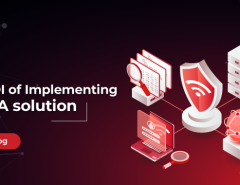Compliance, in the simplest possible terms, refers to integrating certain industrial standards based on specific requirements. While regulatory compliance can easily impose additional costs to the IT networks and security systems, the costs and repercussions for not complying with the industry guidelines are significantly higher.
Should We Care About Compliance?
Believe it or not, compliance is one of the biggest challenges faced by the credit unions while preparing for 2018. With customer expectations concerning service, convenience and access amplifying exponentially, industries are compelled to innovate while staying competitive. Industries are increasingly pairing up with third-party service providers for staying ahead of the competition. However, this approach is also exposing them to newer cybersecurity threats. As the attack surface continues to grow, it is essential that credit unions formulate their own regulatory compliance roadmap for the industries to follow.
For businesses it is crucial to abide by the regulatory guidelines as the compliance requirements will continue to evolve with the advancing technological innovations. Caring about compliance streamlines the enterprises in a constructive manner. It prevents them from moving forth at an unabashed pace; thereby minimizing the various cybersecurity threats.
Read more: Are you an easy hacking target?
Understanding Industry Specific Compliance Requirements
Every industry faces cybersecurity threats of diverse nature. Therefore, it is important that organizations start safeguarding their digital data reservoirs against unauthorized entities. There are a few law-prescribed security regulations which are completely industry specific. Be it an individual or a company, every entity must follow these regulations with utmost care.
1. HIPAA
As the name suggests, Health Industry Portability and Accountability Act or HIPAA is a compliance law for the healthcare industry. This regulatory compliance is for healthcare plans, healthcare providers, clearinghouses and any entity that is associated with handling of patient and health-related insights.
It all starts with HIPAA Privacy which ensures that safeguards are implemented for protecting patient information. HIPAA Security involves putting a limit on the extent of information usage and sharing. Following this is HIPAA Enforcement that concerns BAAs or Business Associate Agreements. BAAs ensure that privacy and security measures are implemented, at every given point. In terms of healthcare, BAAs require authorities to disclose and use patient information in an appropriate manner.
The last cog in the compliance wheel is the HIPAA Breach Notification Rule that requires businesses and associates to notify the affected individuals and even the media, in case the health information modules are breached.
2. GDPR
Any discussion regarding compliance is incomplete without mentioning GDPR. GDPR or General Data Protection Regulation is typically drafted for the European Union and industries that come under the same. This form of regulatory compliance requires enterprises to maintain integrity, availability and confidentiality of the concerned data subjects. In addition to that, GDPR also focuses on disaster recovery, secured data access and even the breach notification rule.
3. PCI DSS
Payment Card Industry Data Security Standard is clearly formulated for safeguarding and securing credit card information. When it comes to the compliance, PCI comes forth with specific requirements for securing the confidential data sets. Be it protecting the cardholder data, maintaining vulnerability management program, putting across stringent control methods or maintaining information security policy; PCI DSS compliance requirements cover every aspect of privacy and security.
Non-Compliance and the Associated Risks
HIPAA non-compliance attracts massive monetary penalties for the violators followed by a compromised image. PCI non-compliance also involves penalties but the fines vary according to the degree of violation and can be levied on banks or merchants, depending on the pre-existing rules.
For GDPR, nonconformity, according to the Article 83 results in a sizeable penalty of 10000000 EUR for basic violations and 20000000 EUR for the more discrete ones.
Read More: Cybersecurity and Compliance requirements: Part 2
Seqrite’s Role in Cybersecurity Compliance
With Seqrite’s Endpoint Security on-board, industries need not worry about the regulatory compliance. Objectives concerning data security are best fulfilled with Seqrite’s Encryption service. Apart from that, industries worrying about data loss can deploy Seqrite DLP functionality that monitors data sets and a host of other confidential insights, including credit card information, SSN, document files amongst other things.
Seqrite EPS also comes forth with anti-ransomware and encryption functionalities which serve organizations perfectly when it comes to maintaining conformity with the regulatory guidelines. Lastly, real-time alerts are also available, helping enterprises send through the breach notifications, whenever required.
As an IT security partner for your business, Seqrite provides comprehensive endpoint security from advanced cyber threats. To know more, visit our website or




